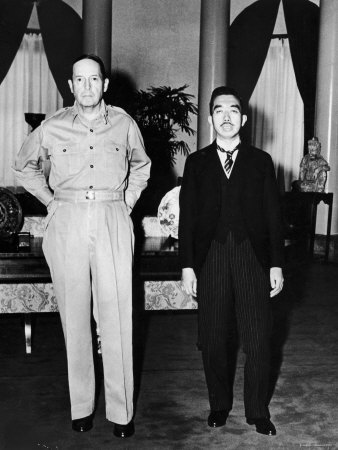 |
| Gen. MacArthur & Emperor Hirohito |
- In what way does having a global security interest indicate hegemonic aims?
- Is a policy of preemption or prevention an indicator of hegemonic aims? How about a global network of naval and air bases?
- Might there be defensive, non-expansionist reasons for seeing security interests all over the globe, for wanting to revise the international system?
- Might there be non-hegemonic reasons for maintaining a global system of military bases?
- If some policymakers in high ranking positions are calling for hegemony, does that make the state in question hegemonic?
-In what way does having a global security interest indicate hegemonic aims?
ReplyDeleteIf you have a global security interest you clearly have interest globally which means that your countries influence expands into other countries. This could be considered hegemony.
-Is a policy of preemption or prevention an indicator of hegemonic aims? How about a global network of naval and air bases?
I think preemption is more so than prevention because with preemption you are taking the risk that whatever action you preempt of not occurring. In prevention if you stop something from occurring before it happens it seems less hegemonic. Regardless in both situations you seem somewhat hegemonic. A global network of air and naval bases is in my opinion hegemonic, because you can easily intervene into the affairs of the country that the base is in.
-Might there be defensive, non – expansionist reasons for seeing security interests all over the globe, for wanting to revise the International system?
Yes, offshore balancing is essentially a non- expansionist way of seeking security interests all over the globe. As far as revising the international system, there are security and economic reasons why one may want to revise the system.
-Might there be non- hegemonic reason for maintaining a global system of military bases?
Yes, offshore balancing.
-If some policy- makers in high ranking positions are calling for hegemony, does that make the state in question hegemonic?
It depends if the country is democratic or not and it would depend on how high ranking the people that hold those beliefs are, but generally no.
In what way does having a global security interest indicate hegemonic aims?
ReplyDeleteIf a country has a global security interest it will be more likely to be invested in the security of other countries which could be interpreted as hegemonic.
Is a policy of preemption or prevention an indicator of hegemonic aims? How about a global network of naval and air bases?
I think a policy of preemption or prevention can be an indicator of hegemonic aims depending on how it is interpreted. The policy of preemption and prevention can be an indicator of hegemonic aims because it involves striking preemptively before any acts of aggression are actually committed. The policy of preemption is a major component of the Bush Doctrine. Bush citied preemption in order to invade Iraq by claiming Iraq had nuclear weapons. In reality Iraq did not have nuclear weapons and it seemed as though Bush used the policy of preemption to advance his own and the United States’ hegemony into the Middle East.
A global network of naval and air bases can also be an indicator of hegemonic aims because it would easily allow a country to get involved in the affairs of other countries.
Might there be defensive, non-expansionist reasons for seeing security interests all over the globe, for wanting to revise the international system?
A defensive reason for seeking security interests all over the globe would be that the more global security interests a country has the more secure the country will be. It is also arguable that if a country invests in global security interests it will enhance the global security for other countries as well.
Might there be non-hegemonic reasons for maintaining a global system of military bases?
In today’s globalized world it is necessary for a country to maintain a military presence around the world in order to ensure security.
If some policymakers in high ranking positions are calling for hegemony, does that make the state in question hegemonic?
In general, I do not think that if some policymakers in high ranking positions call for hegemony it makes the state in question hegemonic. Although, it does depend on how much power and control the policymaker has over the government. For example, in a democratic country it does not necessarily mean the state is hegemonic. On the other hand, in an authoritarian regime the state would most likely be hegemonic as well.